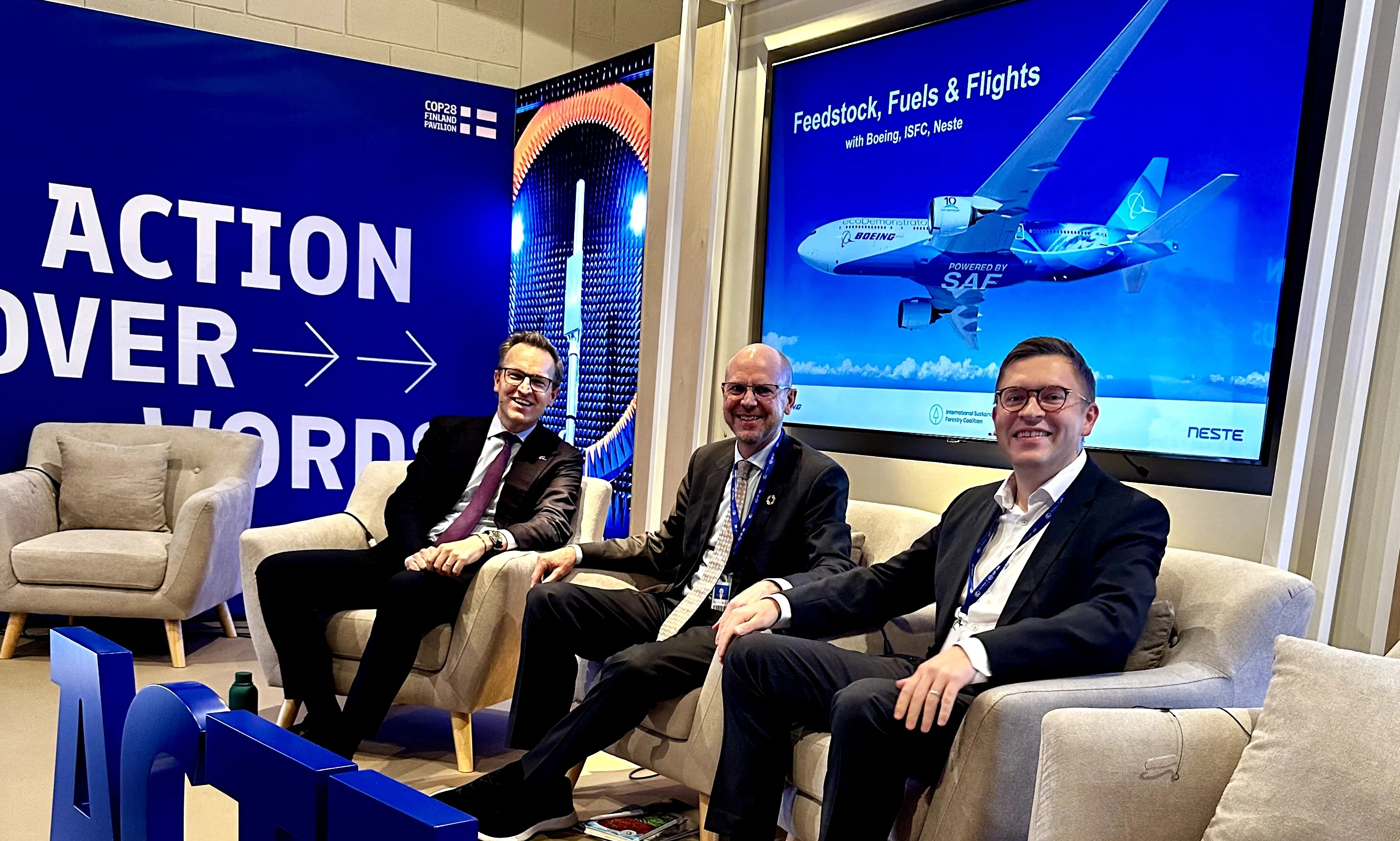
Sustainability
4 minute read
Did COP28 deliver on the expectations?
The United Nations Climate Change Conference (COP28) closed with an agreement that signals the “beginning of the end” of the fossil fuel era. The completion of the world’s first ‘global stocktake’ was generally received as an important stepping stone to accelerate climate action despite disappointment on the lack of concrete targets. But how will governments and businesses turn the pledge into real-economy outcomes, without delay? And what does it mean for hard-to-abate sectors like aviation? In this article, we share reflections from those who were at COP28.
Solving the climate crisis is a global challenge
“Carbon emissions and climate impact do not stop at borders. It impacts all parts of the world in some way or another”, says John Elkington, world renowned sustainability expert, founder of Volans and member of Neste’s Advisory Council on Sustainability and New Markets. “This makes solving the climate crisis a global challenge per definition, needing collaboration and agreement across countries.”
However, aligning almost 200 countries with differing points of view and priorities is a daunting task but John remarks that COP28 President Sultan Ahmed Al Jaber seems to have been considerably more effective in managing the process than many of his critics expected. Balancing the call to transition away from fossil fuels with the near-term interests of fossil fuel producing countries was needed to get agreement.
“The embrace of the COP process by the fossil fuels industry both signals a growing concern about the growing existential threat and political responses to the climate emergency, but – paradoxically - probably also facilitated key elements of the final drafting,” says John.
Cooperation between governments and businesses is crucial
The challenge is now to turn the pledge into real-economy outcomes without any delay and that requires closer cooperation between the public and private sector. Critics might argue that the outcome of COPs are notoriously difficult to translate into real action but business presence was much bigger at COP28 than previously, indicating growing interest from corporate leaders.
For the first time, Neste joined a COP as partner of the Finland Pavilion to actively join discussions and be part of finding solutions. “The private sector is well positioned to develop the necessary solutions for reducing climate emissions and phasing out fossil fuels, but governments globally need to create the market for those via policies and binding emission reduction targets,” says Sami Jauhiainen, Vice President at Neste’s renewable aviation business.
As the world’s leading producer of sustainable aviation fuel, renewable diesel and renewable feedstock solutions for various polymers and chemicals industry uses, Neste is driving the transition to renewable and circular solutions. "We need to reduce emissions in all sectors at the same time and not only where it is cheap and convenient. This requires dealing with the emissions of hard-to-abate sectors where Neste has solutions to offer,” continues Sami, illustrating the opportunities to take action by using solutions available today.
At COP, innovation was also a much discussed topic. “Neste has a long history of innovation and we continue researching and exploring new raw materials and production technologies,” says Sami. “The key to driving the energy transition is to start using the solutions we have available today while innovating the solutions of tomorrow.”
Impacting the aviation industry
One of the hard-to-abate sectors is the aviation industry, today contributing around 2-3% to global carbon emissions but expectations are that this will grow to over 20% if sufficient action is not taken. But as aviation is a globally highly interconnected market, global collaboration and alignment is especially critical for aviation. “International alignment is needed on targets for emission reduction, as well as on the emission accounting rules and sustainability standards for the sustainable aviation fuel (SAF) market to enable the aviation sector to progress towards the goal of net zero carbon emissions by 2050,” says Sami.
He also notes that stakeholders from the aviation, travel and cargo sectors were very visible at COP, highlighting the growing focus on sustainability and climate targets in these sectors. “COP28 provided us a unique opportunity for collaborating and connecting with customers, business partners and public sector stakeholders globally, and also to highlight the potential of the solutions we have available today.”

From left: Brian Moran, Boeing; Ross Hampton, ISFC and Sami Jauhiainen, Neste
Neste was actively engaging and cooperating with leading stakeholders such as Boeing, Airbus, Smart Freight Center and GenZero, in addition to organizing various meetings with private and public sector stakeholders.
So has the beginning of the end of the fossil fuel era really started?
The outcome of COP28 is a historic milestone on transitioning away from fossil fuels, but much more needs to be done to keep the world anywhere close to limiting global warming to 1.5 degree celsius. Or as Sami remarks: “We do not have the luxury to wait but we need to take charge of change, today!”
Credits:
Neste




